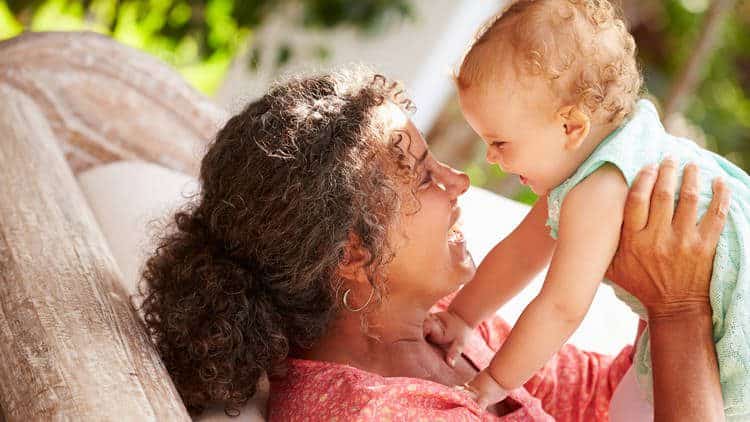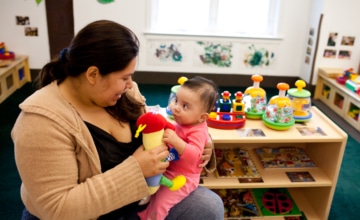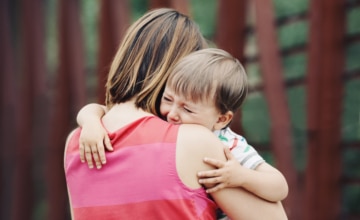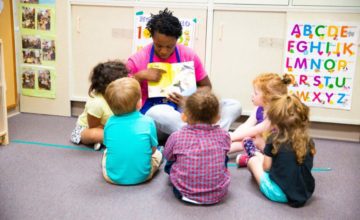ZERO TO THREE developed new resources for grandparents who provide childcare.
I remember getting ready for a work trip when my daughter was four. My parents had arrived at the house and were settling in, just as I was packing up. My daughter sat inside my suitcase and chatted with me as I folded shirts and grabbed shoes.
“I’ll miss you!” I said.
“Mommy,” she replied, “Don’t worry about me. When Grammy and Grampy are here, I don’t miss you at all!”
Though I didn’t know it at the time, my family was using one of the most common forms of child care available: Care by grandparents. The most recent data shows that grandparents in the United States care for 4.8 million children under the age of 5: almost one out of four preschool children.
In order to understand more about grandparents’ experiences as care providers, ZERO TO THREE recently conducted a series of focus groups with grandparents who care for grandchildren ages six and under.
Here’s what we learned.
Grandparents see the time they spend with grandchildren as a gift.
Grandparents told us over and over again how much joy it brought them to care for grandchildren. Unlike the “first time around” (when they were raising us), grandparents told us they felt more relaxed, confident, and patient with their grandchildren. Maria del Carmen, one of the grandparents in our groups, shared that her grandchildren “have infused my life with life… they have given me a reason to live.”
At the same time, grandparents acknowledge that providing care is a commitment.
Grandparents tell us that they step in to help either because they have been asked for assistance or because they saw a need and offered. As Carl, a grandfather, shared: “I do it out of love for my daughter as well as love for my grandson… As a single parent, [my daughter] turned to us and said, ‘Would you like to join us out here, in California?’ I said, ‘That sounds pretty good to me.’”
For some grandparents, however, providing care can limit their ability to work or to pursue hobbies. Talking openly about balance and boundaries—e.g. being clear about when grandparents are “off duty” and honoring these agreed-upon hours—can help everyone feel satisfied with the arrangement.
Conflict happens even in the strongest relationships.
Some grandparents reported that “sharing the care” with their adult child can be challenging. Most disagreements arose out of a mismatch in expectations: What rules and limits should young children be expected to follow? What are appropriate consequences? Sometimes conflict emerged over smaller issues, such as what constituted an appropriate meal or snack.
Grandparents told us that discussing these differences with their children and their partners was not easy. Often they felt as through a lifetime of caregiving experience was invisible to their adult children. As one grandmother shared: “My son thinks he’s Dr. Spock!”
New parents, on the other hand, grandparents to respect their caregiving decisions as they leave the role of “child” behind and take on the identity of “parent.” That’s why open conversations about expectations are so critical.
Since these conversations are never easy, we have developed a tool to help families acknowledge one another’s strengths, explore areas of difficulty, and identify a path forward.
Grandparents may not always be up-to-date on the latest research, so sharing practical information can help them.
Some of the grandparents in our groups acknowledged that spanking was a discipline strategy they still used at times. Others first learned about infant “back to sleep” guidelines from their adult children.
A lot has stayed the same about caring for young children (see: love, patience, stories, and cuddles), but a lot has changed as well. We have put together a series of resources designed to help grandparents learn more about critical research findings in the areas of discipline, nutrition, sleep, and play.
What is the one thing all grandparents and parents share?
Hope for their grandchild’s future was mentioned again and again as a source of great joy to grandparent caregivers (and, I can vouch, parents, too!). Pat, one of our focus group participants, said it best: “To me, [I hope they achieve] whatever they set their minds to do…just to work and live [with] integrity, to be honest, to be truthful, to treat people right, and to do whatever their hearts desire.”
To learn more about the needs of grandparents who provide child care, visit: https://www.zerotothree.org/resources/for-families/grandparents/









